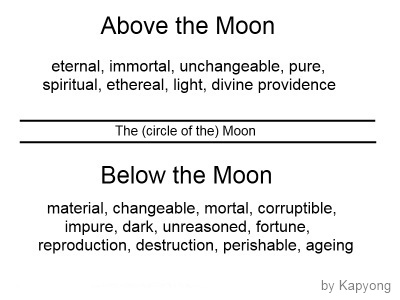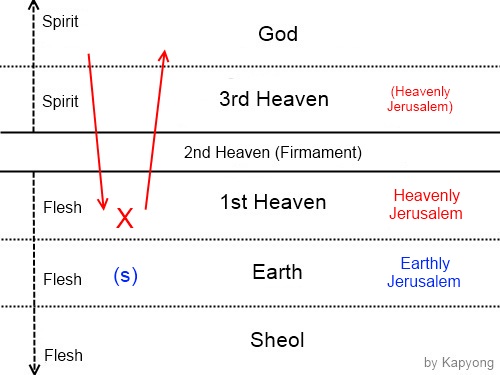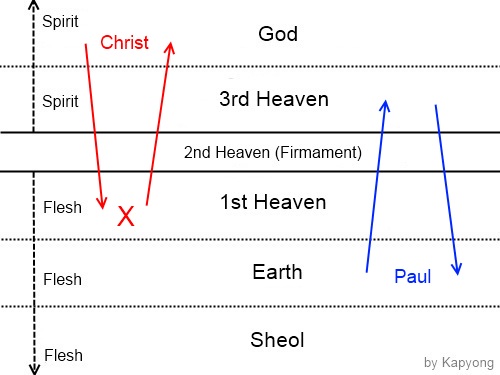
 |
Freethought & Rationalism ArchiveThe archives are read only. |
|
|||||||
|
|
Thread Tools | Search this Thread |
|
|
#291 | |||||
|
Veteran Member
Join Date: Mar 2002
Location: Perth
Posts: 1,779
|
Gday,
Quote:
* Beneath the Moon - material, changeable, mortal, corruptible, impure, dark, unreasoned, fortune, reproduction, destruction, perishable, ageing  The only step Paul had to take is to call that sub-lunar region the realm of 'flesh'. An easy step from material, changeable, mortal, corruptible, impure, dark, unreasoned, fortune, reproduction, destruction, perishable, ageing etc. Flesh is material, mortal, it reproduces, ages... I think the 2 diagrams together show the connection -  'Flesh' is just Paul's way of saying 'beneath the moon'. (And beings in these different regions do indeed have different metaphysical states - according to some authors.) Quote:
X - crucifixion in the sub-lunar sphere (s) - it's effects down here for us on earth Quote:
I hearby give you, and anyone else, permission to use, copy and modify any of the images here provided you note Kapyong as the source of originals. I think diagrams can help a lot, because oft-times I think we don't see each other's views properly. http://members.iinet.net.au/~dal.sahota/qdj/ Quote:
It may be that Paul saw the Heavenly Jerusalem as existing in the 3rd heaven - I don't think Paul ever specifically connects the crucifixion with the Heavenly J. but he does call it our heavenly mother, which would suggest it is within the realm of flesh. On the other hand Hebrews puts the sacrifice in a Jerusalem above but suggests it cannot be 'touched', suggesting it is NOT in the realm of flesh. Figuring out how Paul and Hebrews et al saw the planes and the spheres etc. is not easy, that's why I started drawing explanatory diagrams. I don't know if Earl sees it this way, I hope he comments on my diagrams. Finally, here is another diagram comparing : Christ's descent to the realm of 'flesh' Paul's ascent to the 3rd heaven  In this sense, I think Paul may have imagined himself as a counterpart to Christ. Kapyong |
|||||
|
|
|
|
#292 | |
|
Junior Member
Join Date: Jul 2010
Location: Sweden
Posts: 60
|
Quote:
Let's say you write , "according to my theory", should we then interpret this to mean that you actually are using another person's theory? Because this is precisely what Eusebius did in his statement. He denied that Paul had his own theory, his own gospel. So, if Paul had his own gospel, which he said he had, he was not aware of gLuke and could have written his epistles before the fall of the Temple. |
|
|
|
|
|
#293 | |||
|
Contributor
Join Date: Feb 2006
Location: the fringe of the caribbean
Posts: 18,988
|
Quote:
Quote:
|
|||
|
|
|
|
#294 |
|
Junior Member
Join Date: Jul 2010
Location: Sweden
Posts: 60
|
But Christ, i.e. the Messiah, was/is an earthly figure! The Messiah was believed to be one like Moses, a king who would reveal the (hidden) meaning of the law and create a new law. So if you exchange Christ with the name Jesus in this diagram, we will have Paul as the Christ and Jesus as his heavenly counterpart!
|
|
|
|
|
#295 | ||
|
Veteran Member
Join Date: Apr 2003
Location: Australia
Posts: 5,714
|
Quote:
IMHO putting the Heavenly Jerusalem in the lower heavens -- and the realm of decay and impermanence -- wouldn't fit into the thinking of that time, as far as we can reconstruct it. It may be though that Paul had his own unique views. But that is an argument for another day, I think. Thanks again. |
||
|
|
|
|
#296 | ||
|
Veteran Member
Join Date: Jan 2007
Location: Mondcivitan Republic
Posts: 2,550
|
Oh yeah,
How can I have forgotten the only one that is datable by a named historical figure!? That too could be fit into the chronology of Acts. That makes four then. Are there others, other than internal references to circumstances in other letters that suggest relative order, that can be tied into events datable by means of non-christian authors? I believe 2 Cor 11:32 is the only firmly datable event acknowledged by critics, with the possible exception of the Caligula affair in 2 Thess 2:1-7. As far as I know, the other two I mention are my own original suggestions. DCH Quote:
|
||
|
|
|
|
#297 | |||||
|
Contributor
Join Date: Feb 2006
Location: the fringe of the caribbean
Posts: 18,988
|
Quote:
And why would "Paul" claim that Jesus DIED and was RAISED from the dead on the third day ACCORDING to the SCRIPTURES? 1 Cor. 15 And why would "Paul" use words found ONLY in gLuke? See 1 Cor.11.25 I have EVIDENCE from an APOLOGETIC source that "Paul" was AWARE of gLuke but you have nothing but your imagination. The statement from Eusebius in "Church History" 3.4.8 has SOLVED the Pauline chronology. The apparent CONFESSION by Eusebius has NOW explained why the Synoptics type Gospels and even gJohn were NOT influenced at all by the PAULINE Gospel of SALVATION by the RESURRECTION. ALL the AUTHORS of the four Canonical Gospels were NOT taught about SALVATION by the Resurrection. This is the author of gJohn deduced to be the last written Gospel and AFTER Jesus was supposedly ALREADY DEAD. John 20:9 - Quote:
1Co 15:17 - Quote:
Quote:
Well, I believe "Pauline writers" were AFTER the Jesus story was ALREADY written and KNOWN in the Roman Empire and that "PAUL" did NOT get any revelations from a resurrected dead but from the written Jesus story and EUSEBIUS has CONFESSED that "PAUL" was known to be AWARE of gLuke. I don't have time to waste. I have EXACTLY what I need to say WITHOUT contradiction that "Paul" was AWARE of the Jesus story and was ALIVE AFTER gLuke was written. |
|||||
|
|
|
|
#298 |
|
Veteran Member
Join Date: Mar 2002
Location: Perth
Posts: 1,779
|
|
|
|
|
|
#299 | ||||
|
Veteran Member
Join Date: Jan 2007
Location: Mondcivitan Republic
Posts: 2,550
|
Quote:
The Gaius Caligula affair is documented in detail in both Josephus' War and Philo's Embassy to Gaius. Even though Gaius was best buds with the Jewish prince Agrippa, in reaction to a riot in Alexandria he became adamant that Jews acknowledge his "divinity" and was prepared to force the issue by a statue placed in the Jewish temple. Agrippa literally fainted when he heard about it, and Gaius' own legate to Syria kept stalling, knowing it would provoke a messy Jewish rebellion if he went ahead and did what the emperor commanded. Josephus describes the Jewish reaction as similar to that which met Antiochus Epiphanes in the 2nd century BC. The parallels are striking, and thus a possible synchronism. 1 Now concerning the coming of our Lord Jesus Christ and our assembling to meet him, we beg you, brethren, 2 not to be quickly shaken in mind or excited, either by spirit or by word, or by letter purporting to be from us, to the effect that the "day of the Lord" has [already] come. 3 Let no one deceive you in any way; for that day will not come, unless the rebellion [against God] comes first, and the man of lawlessness [Gaius] is revealed [as such], the son of perdition, 4 who opposes and exalts himself against every so-called god or object of worship [something Gaius was doing in making the statue of Zeus in his own likeness], so that he takes his seat in the temple of God [in the form of the statue, which was to be seated in the temple precincts], proclaiming himself to be God. 5 Do you not remember that when I was still with you I told you this? 6 And you know what is restraining him now [the legate of Syria] so that he [Gaius] may be revealed [as the son of perdition] in his [due] time. 7 For the mystery of lawlessness is already at work [speaking as though the events are transpiring as he speaks]; only he who now restrains it will do so until he is out of the way [Gaius ultimately ordered Petronius to commit suicide, although Gaius was assasinated before Petronius received the orders, and consequently ignored them]. The chronology of the affair are well documented. Quote:
DCH |
||||
|
|
|
|
#300 | ||||
|
Contributor
Join Date: Mar 2002
Location: nowhere
Posts: 15,747
|
Quote:
The tendentious discussions on this subject revolve around apologetics rather than history, with people trying to peddle the notion that the Nabataeans held Damascus for an unsubstantiated second time while Romans would give control of their territory to a non-client king (Aretas IV)--who had previously attacked a client king and earned the wrath of the princeps--or some such related nonsense. Whoever was responsible for the basket story confused his Aretases. Incidentally, ταρσος means a frame of wickerwork or basket. spin Quote:
|
||||
|
|
| Thread Tools | Search this Thread |
|